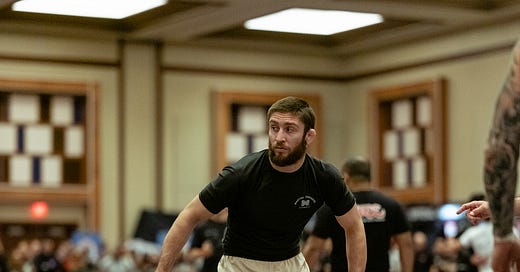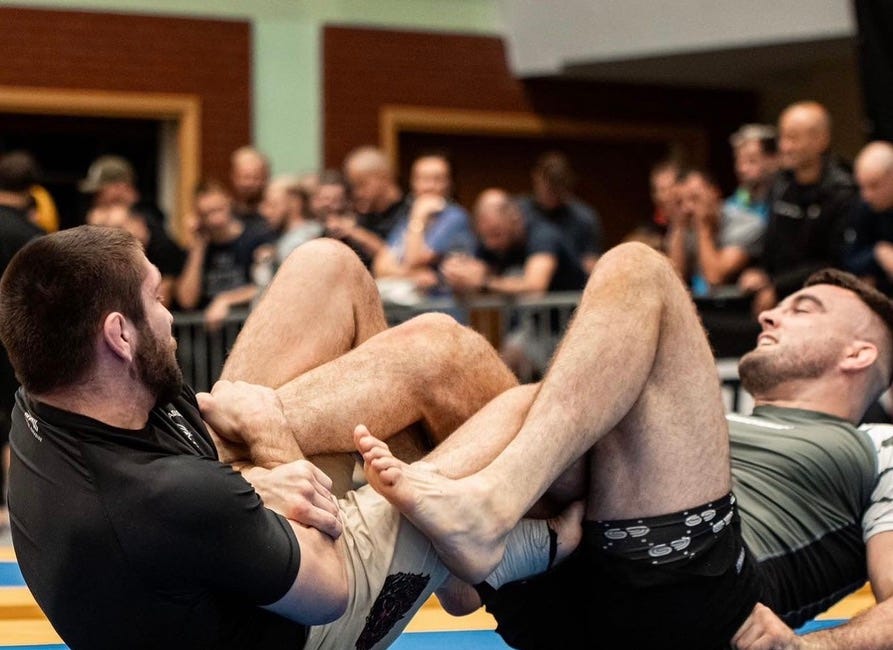
I know what it feels like to be frustrated with your BJJ skill development.
That feeling that like whatever you do, you’re not going to get better. That feeling like you’re doing something wrong, but you have no idea what. That feeling like quitting is a better idea than persisting.
I know what it’s like to inch forward, then plateau, and then do it all over again. It sucks.
That’s kind of been my theme for this year, if I’m being perfectly honest.
However, in the last few weeks, I’ve been really focused on not just honing my skills, but figuring out the best way to hone my skills. I’ve been trying to put more efficient systems in place that help me get better at what I need to get better at.
Here are the biggest roadblocks most people run into when trying to develop skills — and how to deal with them.
1. You don’t study on your own time.
One habit I’ve started in the last 6 months is the bi/tri-weekly ritual of going back to the gym at night after a hard day’s work and “watching training”.
Normally, I study technique on my phone, take the class during training, and talk to my partners after rounds. This is normal. What I have added is that now, I have a more complete study of my Jiu-Jitsu because I study myself.
It’s not enough to study the game, you must also study yourself in the game.
In writing — my other skill — I read a lot of content. I subscribe to dozens of newsletters. I read books daily. I read and study the formatting, wordplay, and story structure of my favorite writers in their best work.
This, luckily, is fun for me. I enjoy watching my sport (and a few other sports) just as much as I enjoy training. I like actually writing a lot more than I like reading and learning about the business of writing, but I see this “study” as a necessary part of improving. I also prefer doing Jiu-Jitsu to watching it.
However, if you want to learn something, you need to become a student of the game. You need to learn every inch. Then you need to learn it backwards.
If don’t study, you’ll get passed up by someone who does.
2. You don’t test yourself properly.
You can test yourself too much, and you can test yourself not enough.
Most people tend to be on the side of not testing themselves enough, but there are a few people (I’ve felt this way before) who test themselves too much.
Imagine maxing out on deadlifts every time you go to the gym. That’s the equivalent of sparring your hardest in BJJ every day, trying to write as many words per day as possible, or trying to read a book in one sitting.
You’re overdoing it.
In order to develop skills, you need to test yourself. You need to immerse yourself in competitive environments. This is a non-negotiable.
However, you also need to know when to rest and focus on building skills. You need to find the balance between giving it all you have and keeping it playful.
3. You don’t work on “supporting skills”.
Some days, I like to go to the gym and just “fight”.
I just do a bunch of hard rolling rounds and I don’t really “work on” anything in particular. I just train. It’s fun.
I do this in writing too.
Somedays, I just sit down at the keyboard and write out whatever I’m thinking or feeling. I just let the words come out. It’s fun to do this sometimes.
But the hard truth of skill development is that supporting skills and specific training is just as important as “doing the thing”. A lot of people want to be “high-level grapplers” but they don’t want to do specific rounds nearly every day. A lot of people want to be writers, but they don’t want to read, edit, and read their work out loud.
If you want to build a skill in the (early stages especially), you need to triple down in your work on the supporting skills of that skill.
The better you get at a skill, the more control you have over your “training”.
This way of thinking is actually how I learned leg locks in BJJ.
4. You don’t have any patience.
It takes a while to get good.
Like, probably longer than you want. Probably longer than a lot of people are willing to put in.
Jiu-Jitsu is a prime example of this rule.
I got my black belt in BJJ after about 7 years of training. I trained several times a day, pretty much every day (one long break for knee surgery in 2018), and I competed all over the United States. I put in a sh*t ton of work and still took 7 years to get pretty decent.
The average hobbyist in BJJ doesn’t put in the same amount of hours, but their journey has its own kind of treachery.
A BJJ hobbyist who wants to be a good grappler eventually probably has to spend at least 2–3 (pretty much always more) days per week in the gym training. They have to also manage a job, often a family, and other stresses of life. You have to train consistently to eventually get a legit black belt.
You have to do this for like 10 years.
Patience isn’t a virtue, it’s the foundation.
Skill development at any level requires a good deal of patience. You have to learn how to chip away at your big goals because that’s the only way you’re going to reach them.
This quote from The Dip illustrates it pretty well:
“A woodpecker can tap twenty times on a thousand trees and get nowhere, but stay busy. Or he can tap twenty-thousand times on one tree and get dinner.” — Seth Godin
You don’t have a good routine.
I’ve spent the last 6 months traveling basically every other week.
I know the Austin airport like the back of my hand. I have a favorite cafe in the Chicago airport. I’ve been to San Diego so many times that flying in dangerously close to the buildings in Little Italy doesn’t even freak me out anymore.
I’ve had a lot of cool experiences in the last 6 months, but I haven’t had the most amazing routine.
The thing is, routine is more important to skill development than the inspiration of the novelty of a new experience. It’s better to follow a boring training routine for several weeks than it is to follow a hectic (but exciting) travel schedule. A disciplined life is a fruitful one.
If you’re building something, the best thing that you can do for yourself is the same thing, every freakin’ day.
Think about learning an instrument. You don’t want to skip practice for weeks on end, right?
Similarly, if you’re writing a book, working on a newsletter, or just trying to get better at Jiu-Jitsu, the worst thing for your progress is an excessive amount of days off.
Closing Thoughts
Life has been fun lately, but a different kind of fun.
A routine, monotonous fun. A fun that I think a lot of people wouldn’t consider to be fun. Training has been extremely challenging. Writing has been hard and I’ve written a ton. So much so that I feel it in my hands and wrists when I try to go to sleep.
It’s not pretty. The daily grind of trying to get better at stuff usually isn’t.
But there’s also a lot of fun each day.
I enjoy nearly everything that I get to (and have to) do. I work my ass off, and I’m lucky that I get to work my ass at cool stuff instead of stuff I hate.
I think most people can improve their skills faster than they do, and it doesn’t require a complete life overhaul. It requires better processes. It requires you to focus, slow down, and work smart — in addition to working hard.
Focusing on overcoming these 5 common roadblocks is a great way to supercharge the improvement process at whatever you want to improve at.
This week’s premium articles:
How (and Why) to Get Good at Leg Locks
If there’s any aspect of Jiu-Jitsu I confidently think of as myself “really good at”, it’s leg locks. But just 3 years ago, I had only ever finished one leg lock in competition — a straight ankle lock at purple that I really just cranked and got lucky on. My opponent was nice and probably afraid of getting hurt. Either way, I didn’t really know what I was doing.
A Day In the Life (2023)
My daily life has changed a lot in the last year. As a result of that, my routine has changed a lot since my last “day-in-the-life” article — which you can read below: My life now is actually a bit more like the one that I wrote before that, which you can read below. That one was from when I had blonde hair — it’s…
If you enjoyed reading this post, share it with friends! Or, click on the ❤️ button on this post so more people can discover it on Substack!





